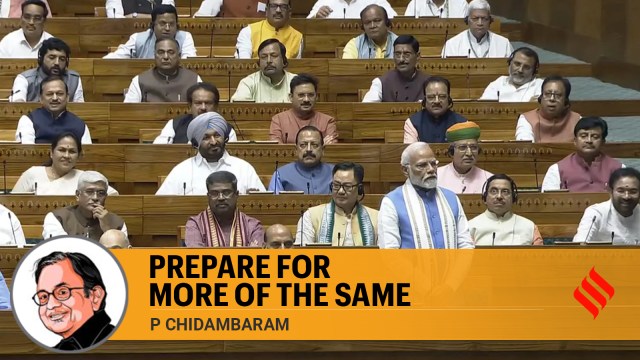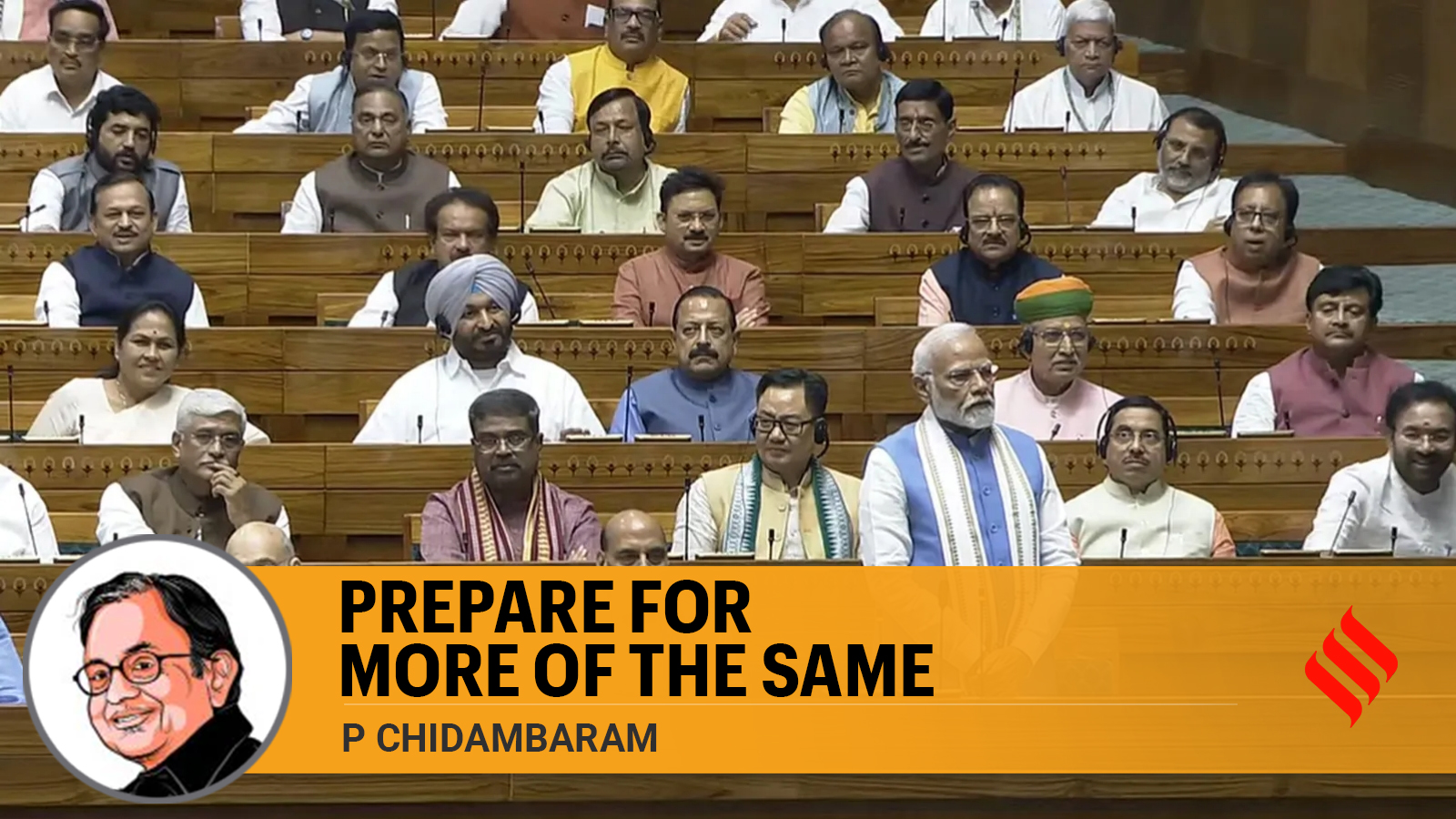
The first regular business days of the Parliament Session confirmed my suspicions. Apparently, nothing has changed as far as the government of Mr Narendra Modi is concerned. Apart from the visible signals (read: ‘What has changed? Apparently nothing’, The Indian Express, June 30, 2024), it is evident that Mr Modi has firmly decreed that the pre-election claims, boasts, policies, programmes, style, demeanour, vendetta et al will be defended, reiterated and continued.
The tragedy is that Mr Modi’s decree seemed to prevail within both Houses of Parliament too.
By convention, the two Houses of Parliament are run by consensus, not by the rule of the majority. A minor question like ‘shall we avoid the lunch break and continue the proceedings in the House today’ has to be resolved not by the fiat of the Presiding Officer or by the majority of the House, but by consensus. Nevertheless, for example, the two Presiding Officers rejected adjournment motions supported by hundreds of MPs to discuss the mega-scandal surrounding the examinations of the National Testing Agency. It was reminiscent of the past five years. Sad.
Mr Modi’s Intentions
The first debate in both Houses of Parliament and the decisions taken outside Parliament made the intentions — and direction — of the government clear: the country will continue to be ruled by the decree of one person; the two crucial allies (TDP and JD-U) and the other minor allies will have no role except to cheer from the Treasury Benches; Mr Modi will not yield any space to his own ministers or to the Leaders of the Opposition in the two Houses; that the government will not accept any mistake on its part; that blame for all the deficiencies of the present government will be laid at the door of past governments beginning with Jawaharlal Nehru’s; that BJP’s spokespersons will continue to be aggressive and obnoxious; that the paid trolls will continue to be paid (may be a little more?) to be more active; and no restraints will be placed on the investigative agencies who will continue to do the bidding of the government.
Clearly, the score of 240 ‘wins’ for the BJP and 292 ‘wins’ for the NDA in a Lok Sabha of 543 members has not deterred Mr Modi. What about the MPs? Four days are too few to arrive at a definite conclusion, but there are preliminary indications.
n NDA/BJP MPs from Maharashtra, Haryana and Jharkhand are running scared because there is a state election around the corner, and they fear the worst. The slow implosion of the Mahayuti government in Maharashtra; the even-steven result in Haryana (5 Congress, 5 BJP); and the thumping judgement of the Jharkhand High Court granting bail to Mr Hemant Soren have put a new wind in the sails of the I.N.D.I.A. bloc in the three states.
📌 The NDA/BJP suffered setbacks in Punjab, Rajasthan, Uttar Pradesh, West Bengal, Meghalaya, Manipur, Nagaland and Karnataka but, fortunately, there is no state election immediately.
📌 The NDA/BJP was vanquished in Kerala and Tamil Nadu.
📌 NDA/BJP MPs from Delhi, Himachal Pradesh, Uttarakhand, Bihar, Madhya Pradesh, Chhattisgarh, Assam, Odisha, Andhra Pradesh, Telangana and Gujarat wore broad smiles on their faces but they are embarrassed by the ‘coalition’ tag and uncertain about the longevity of the alliance.
Mountain To Climb
The BJP knows that it has a mountain to climb before it can claim to be an invincible party. Likewise, the Congress too has a mountain to climb; in fact, a taller mountain. I may point out that the Congress won the bulk of its 99+2 seats in nine states; in nine other states with 170 seats, the Congress won just four; and the Congress did not contest 215 seats (the allied parties contested them). While the Congress and the I.N.D.I.A. bloc constitute a formidable Opposition, they are not in a position to defeat the government.
The keys to the kingdom are in the hands of the TDP (16 MPs) and JD-U (12 MPs). Both will bide their time. Both will await the Budget. Both will keep up the demand for ‘special category’ status which they know Mr Modi will not give them. Both will await the outcome of the state elections in Maharashtra, Haryana and Jharkhand that are due in a few months.
Guesses On Policies
What does the uncertain political situation mean for economic policies? I may hazard some guesses:
- The government will continue to be in denial mode: they will deny widespread unemployment, high inflation in wage goods (especially food articles), stagnant wages/income among the ‘non-regular’ and ‘casual’ workers, entrenched poverty among the bottom 20 per cent of the population, and extreme inequality. Hence, there will not be a radical overhaul or re-set of the current economic policies.
- The government will continue to invest in infrastructure and vanity projects. While there are economic benefits of government expenditure on infrastructure, absent private investment, the growth rate will be moderate. It will be boosted by dubious statistics.
- The government will continue to follow the South Korea model of chaebol-led growth. Monopolies and oligopolies will flourish in key sectors. Consequently, MSMEs will languish; job creation will be sluggish. Semi-educated and unskilled youth — millions of such youth will enter the job market every year — will be the worst sufferers.
- The third term of a government under an ageing leader will not be able to attract the talent that can bring about a radical transformation of key sectors like education, healthcare, environment and climate change, agriculture and forestry, and science and R & D.
Mr Narendra Modi believes in more of the same. His speeches in Parliament promised as much. So, prepare for more of the same.



